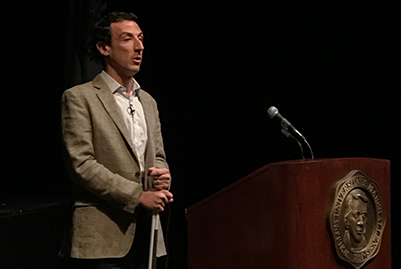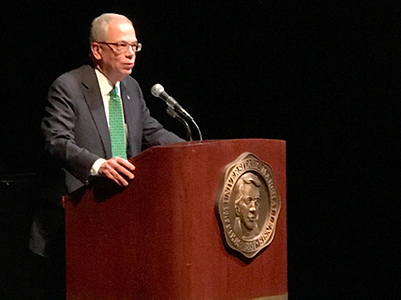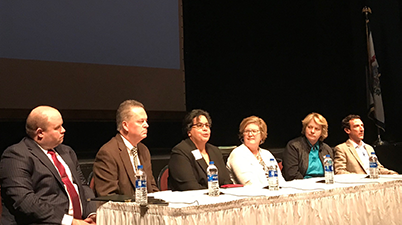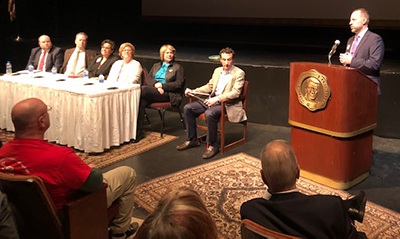
On February 25, members of Marshall University and the local business community of Huntington, WV were treated to an informative and entertaining evening at the Joan C. Edwards Performing Arts Center with engaging speaker and accomplished author, Isaac Lidsky. Through speaking engagements—such as his TED Talks—and within the pages of his New York Times bestseller, “Eyes Wide Open,” Lidsky shared his experiences of overcoming personal and professional challenges as a person with a visual impairment.
The evening’s event, “Master Your Reality with No Limits,” was made possible through a partnership between Marshall University President’s Office and The American Foundation for the Blind (AFB). Dr. Jerome Gilbert, President of Marshall University, had this to say about the event:
“Marshall University is known for its accessibility and openness to all, and that is why hosting this special event with Isaac Lidsky is a perfect fit for our campus. We look forward to learning Isaac’s inspiring story and for him to share his thoughts on how to lead a life to the fullest potential, without limits.”
A panel discussion followed featuring Huntington influencers Cathy Burns, Executive Director, Huntington Municipal Development Authority; Monica Brooks, Ed.D., Associate Vice-President for Online Learning & Dean of University Libraries, Marshall University; Mike Owens, Vice-president of Sales at Strictly Business Computer Systems, Inc.; Ryan Saxe, Superintendent of Cabell County Schools; and Dr. Stephanie A. Skolik, Ophthalmologist.
Before the crowd adjourned for refreshments and networking, Lee Huffman, Editor-in-chief of AFB’s online magazine, AccessWorld, updated the audience on local initiatives in which AFB is involved.
One such initiative is creating a best practices guide for hospitals treating patients who are blind or low vision. Through a grant, The Cabell Huntington Hospital Foundation will fund a program wherein AFB will design, develop, and develop best practices that can improve access and experiences for visually impaired patients in hospital settings. AFB will provide materials in alternative formats, including braille, large print, and e-text, so patients or hospital staff with vision loss can easily access them.
Another project in progress is advancing the accessibility of "Clio," a free history-based mobile app and website founded by the university. The app's developer, Dr. David Trowbridge, and his team recently received a nearly $100,000 grant from the National Endowment for the Humanities (NEH). The goal of the project is to improve the user experience of the app for people who are blind or visually impaired. Drawing on AFB’s experience developing the fully accessible Helen Keller Archive, and the organization’s deep commitment to helping other organizations reach their digital inclusion goals, partnering with Marshall University to make this unique historical resource accessible to all was a no-brainer.
Lee Huffman said about the announcement of the project:
“The American Foundation for the Blind is thrilled the NEH has awarded funding to the Clio App to increase its accessibility for people who are blind or visually impaired. We applaud Dr. Trowbridge’s commitment to accessibility, and we look forward to serving as accessibility consultants to Dr. Trowbridge and his team as they make Clio accessible to everyone, including the estimated 26.9 million Americans who experience vision loss.”
In 2018, Marshall University joined the Teach Access Consortium. This consortium is composed of universities and major technology companies such as Microsoft, Facebook and Adobe, with the purpose of enhancing the teaching of accessible design principles in undergraduate education. Dr. Lori Howard, associate professor of special education and chair of the Faculty Committee for Students with Disabilities, has recruited AccessWorld technology experts Lee Huffman and Aaron Preece to record a series of videos explaining assistive technologies and the impact of accessibility and inclusion in today's curriculum.


